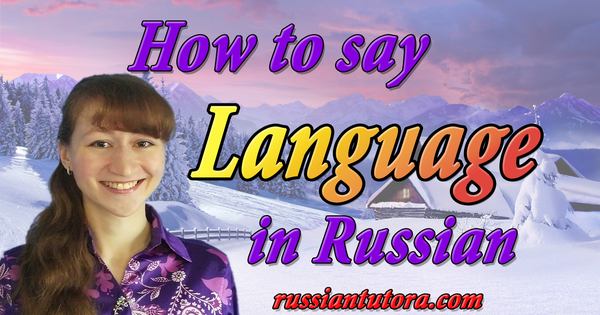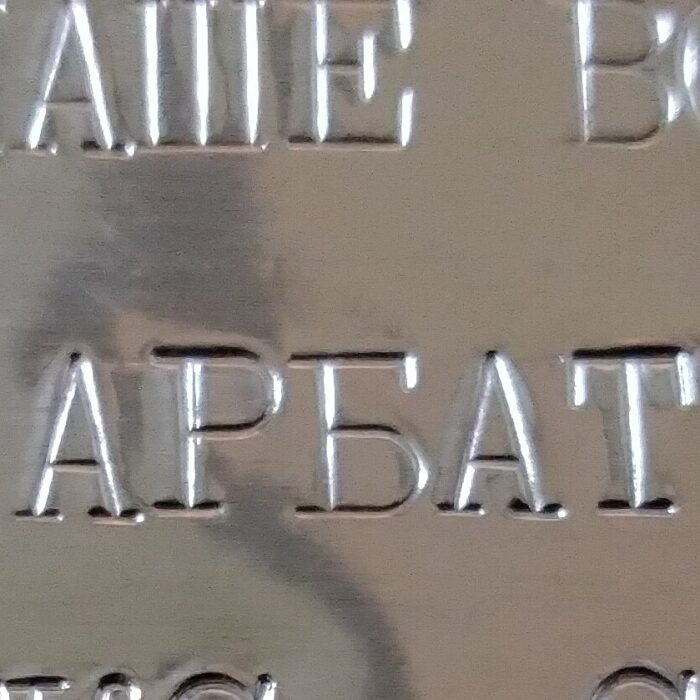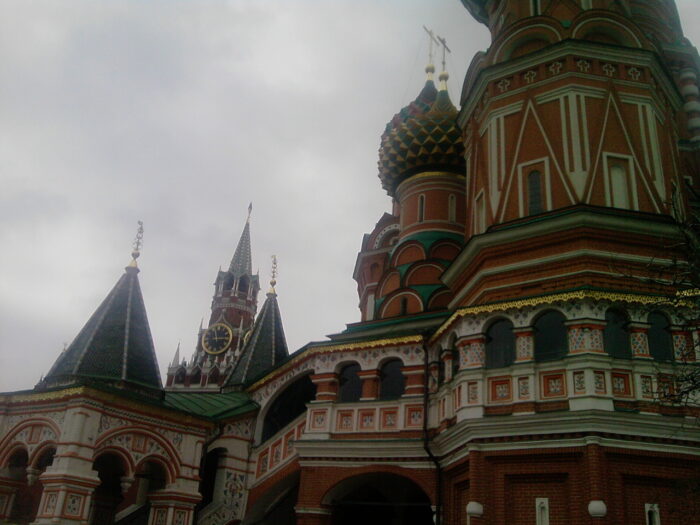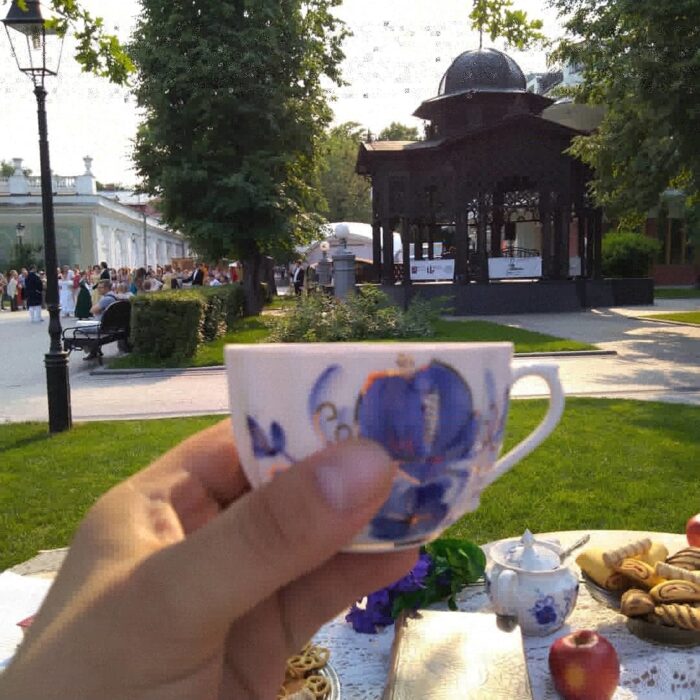On this page you will learn how to say language in Russian
язык [yi-ZYK]
русский язык [ROOS-kiy yi-ZYK]
английский язык [an-GLIY-skiy yi-ZYK]
[baslider name=”language in Russian translation”]
язык [yi-ZYK] = language – noun, Masculine, Singular, Nominative Case
русский язык [ROOS-kiy yi-ZYK] = the Russian language
русский [ROOS-kiy] = Russian – adjective, Masculine, Singular, Nominative Case
английский язык [an-GLIY-skiy yi-ZYK] = the English language
английский [an-GLIY-skiy] = English – adjective, Masculine, Singular, Nominative Case
- Video
-
- Pronunciation
- In English letters
-
язык [yi-ZYK]
русский язык [ROOS-kiy yi-ZYK]
английский язык [an-GLIY-skiy yi-ZYK] - Image
-
[baslider name=”language in Russian translation”]
- About the word
-
язык [yi-ZYK] = language – noun, Masculine, Singular, Nominative Case
русский язык [ROOS-kiy yi-ZYK] = the Russian language
русский [ROOS-kiy] = Russian – adjective, Masculine, Singular, Nominative Caseанглийский язык [an-GLIY-skiy yi-ZYK] = the English language
английский [an-GLIY-skiy] = English – adjective, Masculine, Singular, Nominative Case
Perhaps, you would also like to learn how we say how are you today in Russian. See also how to say you too and happy new year in Russian.
Learning Russian has gotten popular today in the world. It may be that you have previously started picking up Russian when you heard Russian words said in a movie, in a song, or written in a book (in a marginal note). Perhaps, you needed to learn some cool popular Russian phrases. You surfed YouTube and Google seeking for a Russian pronunciation guide to pick up elementary Russian pronunciation and spelling. Or perhaps you felt like learning how to speak and write Russian and you asked yourself how to write Cyrillic in English letters.
On this Internet resource you can find general phrases in English translated to Russian. Plus, you can listen to Russian language audio in MP3 files and learn most everyday Russian phrases. However, language acquisition is not limited to learning the pronunciation of words in Russian. You need to get a live picture of the word into your mind, and you can do it on this website by learning popular Russian words with images. And much more! You can not only listen to online recordings of Russian phrases and popular words, but look at how these words are articulated by watching a video and learning the translation of the word! At last, to make the pictures of the words sink into your mind, this Internet resource has a pronunciation handbook in English letters. Thus, as you can see, we use a broad complex of learning instruments to help you win in studying Russian through English.
Now you can come across various free resources for learning Russian: podcasts, Internet pages, YouTube channels and Internet pages like this one that will help you study orthography, pronunciation, grammar, Russian Cyrillic letters, helpful Russian phrases, speaking. However, all these Internet resources give you unstructured language details, and this can make things complicated for you. To get rid of confusion and get organized knowledge as well as to save your time, you need a Russian tutor because it’s their concern to organize the material and give you what you need the most. A teacher knows your strengths and weaknesses, your unique pronunciation and knows how to reach your language aims. The only thing you need to do is to count on your teacher and enjoy your high-level Russian language in a 6-month time.
Now you know Russian word for language.
Shuba and glasnost: historical borrowings
One of the earliest borrowings from Russian was the word “sable” (from the Russian: sobol — a
carnivorous mammal of the Mustelidae family native to northern Europe and Asia). In the 12th-13th
centuries, this animal’s fur was a form of currency, and in 14th century English dictionaries the word
«sable’’ can be found. In addition to the meaning of the noun, it became an adjective for “black.”
A large number of Russian borrowings came to the English language in the 16th century, which was a
time of growing Russian-English trade and political relations. Many such words concerned traded goods:
Beluga — a type of whale or sturgeon
Starlet — a small sturgeon of the Danube basin and Caspian Sea; farmed and commercially fished for its flesh and caviar
Kvass — a fermented mildly alcoholic beverage made from rye flour or bread with malt; sometimes translated into English as “bread drink”
Shuba — a fur coat
Czar (or tsar) – Russia’s ruler until the 1917 Revolution
Ztarosta (starosta) — a title that designates an official or unofficial leader; the head of a community
(church starosta, or school starosta)
Moujik (muzhik) — a male peasant
In the 18th and 19th centuries, other Russian words originally specific to Russian history entered into
English. Nowadays, however, they mostly can be found only in historical works or books of fiction:
Ispravnik — the chief of the district police
Obrok – an annual tax formerly paid by a Russian peasant engaged in trade
Barshina — forced labor of peasants on a landlord’s land
In the 19th century, words related to the socialist and democratic movements in Russia entered into
English:
Decembrist — a participant of the uprising against Czar Nicholas I at the time of his accession in St.
Petersburg on Dec. 14, 1825
Nihilist, nihilism — a denial of the validity of traditional values and beliefs. The term spread after
publishing of the novel, Fathers and Sons (1862), by Russian writer Ivan Turgenev, where the main
character is the nihilist Bazarov.
Narodnik (from Russian “narod” — people) – a member of the 19th century rural socialist movement who
believed that political propaganda among the Russian peasantry would lead to the awakening of the
masses to challenge the czarist regime.
Intelligentsia – society’s intellectual elite
Of course, the words “nihilist,” “decembrist,” and “intelligentsia” are not truly Russian in origin and are
borrowed from Latin. However, these words came into English from Russian.
After the 1917 Revolution many Russian words appeared in many languages. Most are used to denote
completely new things and notions specific to Russia and Russian politics.
Here is a list of some well-known Russian words from the Soviet era:
Bolshevik (from Russian for “majority”) — a member of the majority faction of the Russian Social
Democratic Party, which was renamed the Communist Party after seizing power in the October
Revolution in 1917.
Samizdat — a system in the USSR and countries within its orbit by which forbidden literature was
clandestinely printed and distributed; also such literature
Soviet — a revolutionary council of workers or peasants in Russia before the Revolution; also, an elected
local, district, or national council in the former Soviet Union.
Sputnik (originally – “a traveling companion”) — the name given to a series of Soviet-era satellites; the
first objects launched into space
Cosmonaut — a Russian astronaut
Kolkhoz (abbreviation for Russian “kollektivnoye khozyaystvo”) – a cooperative agricultural enterprise
operated on state-owned land by peasants; a collective farm
Tovarishch — a companion or fellow traveler; used as a direct form of address in the Soviet Union;
equivalent to comrade
Gulag — originally an acronym for a Soviet-era system of forced-labor camps; it now can refer to any
repressive or coercive environment or situation
Apparatchik – the name given the Communist Party machine in the former Soviet Union; also a member
of the Communist Party and an official in a large organization, typically in a political one.
American
academic and author James Billington describes one as «a man not of grand plans, but of a hundred
carefully executed details.” It’s often considered a derogatory term, with negative connotations in terms
of the quality, competence, and attitude of a person thus described.
The words “pioneer” and “brigade” had existed in English, but they got new meanings as “a member of
the children’s Communist organization” and «labour collective» after the revolution in Russia. A new political regime in the 1990s created the new words, “glasnost” and “perestroika.”
Glasnost — an official policy in the former Soviet Union (especially associated with Mikhail Gorbachev)
emphasizing openness with regard to discussion of social problems and shortcomings.
Perestroika — a reform of the political and economic system of the former Soviet Union, first proposed
by Leonid Brezhnev at the 26th Communist Party Congress in 1979, and later actively promoted
by Mikhail Gorbachev starting in 1985.
Borscht and kazachoc: cultural borrowings
Other borrowings relate to Russian cultural and gastronomic traits.
Pelmeni — an Eastern European dumpling filled with minced meat, especially beef and pork, wrapped in
thin dough, and then boiled
Borscht (Borshch) — a beet soup served hot or cold, usually with sour cream
Kissel — a viscous fruit dish, popular as a dessert and as a drink
Vodka (barely needs to be introduced) — a distilled beverage composed primarily of water and ethanol,
sometimes with traces of impurities and flavorings, 40 percent alcohol by volume ABV (80 US proof).
Medovukha — a Russian honey-based alcoholic beverage similar to mead
Molotov cocktail — a makeshift bomb made of a breakable container filled with flammable liquid and
with a rag wick that is lighted just before being hurled. “Cocktail” named after Vyacheslav Molotov:
while dropping bombs on Helsinki, Soviet Foreign Minister Vyacheslav Molotov claimed the Soviets were
only dropping food and drink to their comrades.
Russian roulette — a very dangerous game of chance where each player points at their own head with
a gun that has one bullet in it and five empty chambers
Kazachoc (literally translated it means «Little Cossack») — A Slavic dance, chiefly Russian and Ukrainian,
with a fast tempo featuring a step in which a squatting dancer kicks out each leg alternately to the front.
Sambo — a Soviet martial art originally developed in the former Soviet Union. The word «SAMBO» is
an acronym for SAMozashchita Bez Oruzhiya, which literally translates as «self-defense without
weapons.»
You definitely have heard the Russian word “babushka.” When it entered into the English language, in
addition to its original meaning “grandmother,” it got another one: a type of scarf commonly worn by
babushkas.
After 1991, there were some new words such as “gopnik” or “silovik” still coming to other languages.
Gopnik — a pejorative term to describe a particular subculture in Russia and other Slavic countries that
refers to aggressive young men or women of the lower-class from families of poor education and
income, somewhat similar to American “white trash.”
Silovik — a word for state officials from the security or military services, often officers of the former KGB,
GRU, FSB, SVR, the Federal Drug Control or other security services who wield enormous political and
state power.
Some linguists even claim that one of the most popular verbs in modern English, “to talk,” has
Scandinavian roots — “tolk,” which is originally from the Russian “tolk,” “tolkovat”. And the word «milk»
was borrowed from Slavic tribes as «meolk,» and then as «milk.» There’s a similar story for other words
such as «honey» (Old English — meodu, Russian — mjod).
Try to guess the meaning of these words of Russian origin:
Shapka
Pirozhki (also piroshki)
Spetsnaz (or Specnaz)
Zek
Which Russian words have you met in other languages? Share your comments!
If using any of Russia Beyond’s content, partly or in full, always provide an active hyperlink to the original material.
Get the week’s best stories straight to your inbox
The Russian language is a global language, and one of the UN’s official languages, not limited to Russia’s boundaries at all. It is used in space (the first language in space, actually), in Antarctica, on the Internet. Well, almost everywhere, though not as widespread as English.
Russian lends its vocabulary to other languages. Global languages, like English, accept geological and paleontological, historical and political terms, names for newly discovered animals and chemical elements, not to mention exonyms, like troika, czar, balalaika, dacha, samovar. Of course, there are a lot more words taken from English into Russian than vice versa. But English is not the only language in the world. Kyrgyz and Finnish, Turkmen and Latvian, not to mention minor languages found in Russia itself are full of somehow changed Russian words.
Russian is the language of great writers: Pushkin and Lermontov, Tolstoy and Dostoyevsky, Chekhov and Gogol, Pasternak and Nabokov… Another famous writer, Ivan Turgenev called the Russian language “Great, powerful, truthful and free”. And it’s true. Russian does open new doors for everyone who takes the challenge to study it. And no, Turgenev’s quote is not arrogant; he didn’t say “the most,” so it’s even pretty modest.
Funny Cyrillic
One thing that keeps many people away from studying Russian is the Cyrillic script, or the Russian alphabet. But there’s nothing to be scared of.
There are different methods of learning the letters and sounds of the Russian alphabet. For example, the one right here, on LHLIB.RU.
Also you can try using Cyrillic for writing words and names from your culture that you know very well.
Look at this chant. It will help you remember the way Russian letters LOOK.
А – A
Б – lowercase b with a roof
В – capital B which is not B
Г – Capital L reflected upside down
Д – shed with a window
Е – and just E
Ё – E with two dots
Ж – big asterisk
З – Three
И – backwards N
Й – and once again
К – K
Л – Shift+6
М – M
Н – H
О – O
П – pi
Р – now, a little easier, P
С – C
Т – T
У – Y
Ф – O with a stick inside from up to down
Х – X
Ц – U with a tail
Ч – and open 4.
Ш – normal flat W
Щ – and one with a tail
Ъ – lowercase b with a roof to the back
Ы – lowercase bl
Ь – lowercase b
Э – round and reversed letter E
Ю – cufflink or 10 with a belt between
Я – backwards R
They are Russian letters as they are!
Er…typed. Russian cursive written letters will take you some more time.
Russian grammar will keep you awake
Not only does Russian cursive make you cry, but also Russian grammar keeps you awake.
Russian inflectional morphology includes 6 cases (for a few words there are more), 3 genders, 3 persons, 2 numbers, 3 tenses and a lot of forms for every word (except for a few loan words ).
Yes, there are charts with rows and columns filled from top to bottom. But I swear, as soon as you start learning all those charts, you’ll find some cells in those charts EMPTY, because that very form of the word is impossible.
Let’s take a look at those gaps!
Adjectives
Russian is full of verbs. Often English adjectives can be translated into Russian with verbs:
to be late – опоздать
to be sick – болеть
to be jealous – ревновать
Unlike in English, where one noun before another one can potentially have the function of an adjective, in Russian an adjective has to be made with certain endings and less certain suffixes.
Some words of foreign origin, like фейхоа, киви, don’t have adjectives and have to be used as nouns only. ( Many Russians think it’s because they’re foreign and relatively new, but that’s not the true reason, for there are many more exotic fruits which can get their adjectives easily: банановый, джекфрутовый.) The Russian language didn’t use to have such words before and therefore had no rule for that. The typical final letter in native neutral gender words used to be just O and E.
There is a stranger thing. While adjectives from most week days exist and feel good, the ones from “Wednesday” and “Thursday” don’t.
First person singular future
When you talk about yourself in the future, for example, you promise to win a game or to beat an opponent and you’re about to use the word победить, you soon find that all imaginable forms such as победю, побежу, побеждю are not acceptable in the modern standard Russian. They are considered illiterate, and the correct form simply doesn’t exist. Well, of course you can use synonyms like “выиграю, одолею, сокрушу,” but they’re the words derived from other roots. There’s only an nonce word, напобеждаюсь, which literally means “I will enjoy my series of victories” , and as you know is never really used by anyone.
But, hey, победить is not the only verb like this. The next one for you to meet will probably be убедить. And still, that’s not the end.
Feminitives
The fashion of using or not using feminitives is a real trap in Russian. Russian does have genders and many words can be changed from male to female. But the rules are not as strict as, say, in Lithuanian, which has a male-female equivalent for every living thing.
The problem is the same as we have with “difficult” adjectives. The ending for a femitive is absolutely clear It’s <–a> or <-я>. But suffixes spoil everything, there are –ев – , -есс-, -их-,-ш-, -ин-, -иц-, -ичк-, -к-… Even worse, some of them have negative connotations. For example, генеральша means “a wife of a general ” instead of “a general ”. To make it even more complicated, Russians disagree with each other about those connotations, and there are diverse opinions whether a certain suffix ( e.g. -ш- ) is derogative or not at all.
The situation with animals is a little better. Most animals have their male-female pairing. But still there are a lot of missing words, because the universal rule doesn’t exist. There is a male polar fox «песец», but looking for a female will lead you straight to the “there’s no such word” position. Don’t even try. There is a female dragonfly (стрекоза). Looking for a male dragonfly may lead you to the word “стрекозёл” which exists only in jokes; in dictionaries, once again, there’s no such thing.
Gerunds
Even though there are many nouns made from verbs, they are not gerunds, because there are no gerunds in Russian. Some of these nouns sound a little like gerunds, but this grammatic form can’t be made from every verb.
When you translate English gerunds into Russian, you may use nouns, infinitives, extra subjects and extra words like “that, how, the way, in order to”. The gerund “being” is especially difficult to translate into Russian.
Many “nouns from verbs” are formed by adding –ние/ -ё.
Читать – чтение,
Плавать – плавание.
but
Бегать – бег (not бежание )
Грести – гребля
Плакать – плач
Спать – сон…
Wait. Сон may mean “sleeping”, but also “a dream”. I mean, “night dream”.
Genitive Case Plural
Speaking of “day dream,” there is the word мечта. Being singular it has all 6 cases. As soon as you use the plural “мечты”, you’ll find an empty cell in” Gen – pl”. There is no word “мечт”. There is the word “мечтаний”, but the meaning of this word is closer to a process than to a common noun.
Is the word “мечта” the only one of this kind? Of course not!
Adverbial participle
Most verbs have adverbial participles, but, of course, a certain number of verbs don’t. Аnd those verbs are not rare. The reason is that they don’t sound very pleasant with those consonant-vowel combinations.
If you want to say either “I sang while writing” or “I wrote while singing” you will inevitably have to rephrase your sentences, for both поя and пиша aren’t welcome in Russian.
Well, there is a way out: you need to add some prefixes and make words like напевая, записывая.
It’s difficult to say “while sleeping”; definitely not “спя”.
Missing verbs
When you describe a thing, it’s important to use words like “looks like”, “sounds like”, “smells like”, “tastes like” and “feels like”.
Russian has verbs for the first three (выглядит, звучит, пахнет), but surprisingly, there are no verbs for the other two, and we have to use preposition-noun phrases, such as на вкус / на ощупь. How come?
The Russian words we should have in English
There are some special Russian words that can’t be translated into English literally. These words are not related to the national philosophy or any cultural features strictly Russian.
Сутки — a unit of time that equals 24 hours within one date.
Быт— the complex of material things and factors of the environment that influence the everyday
routine life of a person or the whole nation.
Успеть— the action of being fast enough to manage to do something in a nick of time or even having
enough time after doing it.
Полтора— one word to say “one and a half”
Опаздывать—the fact of coming late or taking long seen as an activity, where late is not an adverb of
time but the action itself.
Болеть—to be ill seen as activity
Дружить— the act of being friends or getting on well with someone.
Нельзя — one word to say either “forbidden” or ”impossible” or “unacceptable .
The things the Russian Language does without
Learning Russian is not only difficult, but also simple.
Articles
The Russian language has no articles. At all. There words “one” or “this”, but they’re not articles and they don’t have to stand before nouns.
So Russian speakers have no idea about articles before they start studying foreign languages.
Possessive pronouns
The Russian language does have possessive adjectives and uses them with or without nouns. But special possessive pronouns don’t exist.
To be verbs in the Present (am/is/are)
The Russian speakers never forget to use “to be verbs” in the past. But the same words in the present seem to be completely redundant. Even the word “есть” which is supposed to mean “is” is often used in the other meanings like “there is/are”, “to have” and even “eat”. The other present to be verbs like есмь (am), еси, суть (are) are completely archaic. So, Russian speakers haven’t used the present to be verbs in their everyday speech for many generations now.
Stop and think
Now, you see why the gerund “being” is difficult to understand if your first language is Russian. It includes two missing parts of the language!
In the phrase “She is a doctor” only the first and the last words make any sense for Russian speakers, the ones in the middle-don’t.
Substitute One and Ones
Russian speakers use the word “one” as a numeral, but not as a substitute for a noun. If an adjective comes before the substitute “one”, in Russian it’s usually left alone. In case of prepositions and clauses like “ the one with a tail”, “the one I love,” Russian speakers have to use words like “that/which/who”. Well, for “ones with adjectives” “that/which/who” are also used.
The auxiliary verbs “do/does/did”
Questions and negatives are made without any auxiliary verbs.
Answers include main verbs of sentences.
Having no auxiliary verbs in their own language, Russian speakers often mix up “to do” and “to be” verbs; they look equally redundant to them. It takes a lot of time before they are able to identify if part of the predicate is a verb or not.
Subject-verb-object pattern
Sentences in Russian may not have subjects or verbs, but they are still sentences. The word order is much freer than in English and has just a few obvious restrictions.
Besides, the grammatical subject of a sentence may not be the logical subject of the same sentence.
No wonder Russian speakers may omit subjects, verbs, objects and start sentences with places, times, objects or… whatever. Or misuse “it”.
Using complex objects is also complex! Inevitably, Russian uses the past tense instead of infinitives!
Perfect and Continuous aspects
Russian speakers use only three tenses and just a couple of aspects, e.g. “perfective,” which shouldn’t be confused with “perfect” for there is no perfect aspect in Russian; it is initially beyond their understanding.
Continuous aspect can also be difficult, Russian speakers may remember about –ing forms but may forget about ‘to be ‘verbs or use ‘to be’ verbs along with main base forms in the same sentences, making phrases such as “I am go ” or ”I going”.
The Perfect Continuous aspect is almost totally ignored.
Either
This word is extremely difficult to translate with one word.
It may vary from “any” to “none” to “also not”
Well, go ahead, say the word “Поехали!” (off we go ), the first word outside the planet which was pronounced in Russian.
Strict rules, empty cells and new concepts will definitely let you see more of this life.
Helpful external links:
1) Verb conjugation: русское спряжение – спряжение глаголов bab.la (babla.ru)
2) Wikislovar (Russian Wiktionary): вода — Викисловарь (wiktionary.org)
3) Noun declension: Просклонять словосочетание день рождения по падежам | БезБукв.ру (bezbukv.ru)
4) Everything about Russian: ГРАМОТА.РУ – справочно-информационный интернет-портал «Русский язык» (gramota.ru)
5) Study Russian with Language Heroes! Школа самостоятельного изучения иностранных языков – Language Heroes (lh12.ru)
Фото автора
Create an account to follow your favorite communities and start taking part in conversations.
About Community
This is a subreddit for people looking to learn Russian and all things related to the Russian language. Though Russian is encouraged, most discussions are in English.
—
Это сообщество для людей, изучающих русский язык, и для обсуждения всего, что с ним связано. Использование русского приветствуется, но обсуждения чаще всего ведутся на английском.
—
Copy/paste ⓇⓊ to replace ru in URLs to avoid shadow deletion.

The Russian language is rich not only with its own words, but also with words borrowed from other languages. For English speakers looking to learn the language, studying English loanwords in Russian is a great way to quickly expand your vocabulary and make Russian seem less daunting.
We’ve prepared a list of English words in Russian that you can start using right away. We’ve also included a section about Russian words in the English language to further broaden your horizons.
Let’s get to it!
Table of Contents
- Introduction to Runglish
- Runglish Examples
- Loanwords vs. Runglish
- How to Say These Names in Russian
- English Words Derived From the Russian Language
- English-Russian Paronyms
- Conclusion
Introduction to Runglish
Runglish, also known as Ruglish or Russlish, is a special form of pidgin language which combines both Russian and English elements. This term became popular in the early 2000s, when Runglish was widely used aboard the International Space Station. The thing was that all the crew members spoke English and Russian, so when somebody was short of words in one language, he or she would find equivalents in the other language. Finally, Runglish obtained its status as one of the onboard languages.
Runglish words are mostly used by two categories of people. The first category is Russian emigrants, particularly those who currently live in the U.S.A. The second are Russian teenagers who study English at school, listen to English and American music, watch movies in English, and so on. It’s worth noting that old people don’t understand Runglish and have a highly negative attitude toward it.
Judging by this photo, the need for Runglish aboard still exists.
Runglish Examples
So what exactly would speaking Runglish sound like? Here are a few examples to give you an idea.
Ивент (ivent) – “event”
This is the Runglish version of the word “event,” which originally refers to any occasion, such as a birthday party or meeting. In Runglish, it has a slightly different meaning. It’s mostly applied to big and resonant public occasions. For example:
Ивент месяца: Дэвид и Виктория Бэкхем отмечают годовщину свадьбы.
Ivent mesyatsa: Devid i Viktoriya Bekkhem otmechayut godovshchinu svad’by.
“Event of the month: David and Victoria Beckham are celebrating their twenty-year wedding anniversary.”
Боди (bodi) – “bodysuit”
While the English word “body” is not associated with wardrobe at all, the Russian word боди (bodi) is used for this female clothing item because it fits the body snugly. Let’s look at an example:
Вчера я купила себе очень классное боди.
Vchera ya kupila sebe ochen’ klassnoye bodi.
“Yesterday, I bought a very cool bodysuit for myself.”
Фейс-контроль (feys-kontrol’) – “doorman”
The Runglish word фейс-контроль (feys-kontrol’) has two meanings:
1. A man who works at public places like nightclubs or bars to provide security
2. The process of providing security itself
In both cases, you can see that Russian ‘doormen’ differ from American and English ‘doormen.’
In Russia and other post-Soviet countries, фейс-контроль (feys-kontrol’) may prohibit you from visiting a public place without any explanation, just because he or she doesn’t like your appearance. It’s not like in the U.S.A. or England, where a doorman can only stop you at the entrance if you’re under the age of 21, intoxicated, aggressive, or if your clothing doesn’t match the dress code.
Now that we’ve explained this a bit, let’s look at an example of how this word is used in Runglish:
На входе в ресторан меня встретил серьёзный фейс-контроль.
Na vkhode v restoran menya vstretil ser’yoznyy feys-kontrol’.
“A serious doorman met me at the restaurant entrance.”
Loanwords vs. Runglish
Unlike Runglish, loanwords are borrowed English words in the Russian language that are used without significant changes in their meaning. As a result, native English speakers can understand them easily. Most English loanwords in Russian appear in the spheres of social networking, computer technologies, finances, politics, sports, food, and clothing.
Here is a brief list of basic English words in Russian:
- блогер (bloger) – “blogger”
- файл (fayl) – “file”
- брокер (broker) – “broker”
- президент (prezident) – “president”
- теннис (tennis) – “tennis”
- спикер (spiker) – “speaker”
- ток-шоу (tok-shou) – “talk show”
- ростбиф (rostbif) – “roast beef”
- чипсы (chipsy) – “chips”
- свитер (sviter) – “sweater”
How to Say These Names in Russian
Many Russian people are curious about Western culture and lifestyle. It comes as no surprise that famous English names and brand names are well-known not only in their respective countries of origin, but also in Russia and other Russian-speaking countries. And of course, these names have Russian equivalents. Let’s have a look at some examples:
- МакДоналдс (MakDonalds) – “McDonald’s”
- Волмарт (Volmart) – “Walmart”
- Найк (Nayk) – “Nike”
- Конверс (Konvers) – “Converse”
- Форрест Гамп (Forrest Gamp) – “Forrest Gump”
- Джек Лондон (Dzhek London) – “Jack London”
- Брэд Питт (Bred Pitt) – “Brad Pitt”
- Бейонсе (Beyonse) – “Beyonce”
- Мэрилин Монро (Merilin Monro) – “Marilyn Monroe”
- Дональд Трамп (Donal’d Tramp) – “Donald Trump”
Russian people may not be as passionate about fast food as Americans, but they love it anyway!
English Words Derived From the Russian Language
English speakers don’t even realize how many of the words they regularly use were borrowed from other languages. There aren’t very many Russian words in the English language, but we’ve found some of them for you.
“Intelligentsia”
When this word first appeared in English, it was only applied to Russians. “Intelligentsia” was borrowed from the Russian word интеллигенция (intelligentsiya). In both languages, it refers to a class of highly educated people.
В Москве я познакомился с русской интеллигенцией.
V Moskve ya poznakomilsya s russkoy intelligentsiyey.
“In Moscow, I got to know the Russian intelligentsia.”
“Babushka”
Unlike many other Russian words in the English language, this word is polysemantic in its host language but not its original language. In English, its first meaning is a scarf tied under the chin and the second meaning is an old woman. “Babushka” came from the word бабушка (babushka), which is an affectionate term Russians use to call their grandmothers. By the way, in Russian this word has nothing to do with scarves, so its first English meaning seems a bit funny to many Russian speakers.
Моя бабушка печёт вкусные пирожки.
Moya babushka pechyot vkusnyye pirozhki.
“My grandmother bakes delicious pies.”
We all love our babushkas!
“Mammoth”
Another English word derived from Russian, “mammoth” comes from the word мамонт (mamont) which, in turn, came from the Yakut language. The word mamma means “earth,” from the notion that this huge animal was found in the ground. Besides this, the English word “mammoth” is also used to refer to something of enormous size.
Мамонты вымерли из-за глобальных изменений климата.
Mamonty vymerli iz-za global’nykh izmeneniy klimata.
“Mammoths died out due to the global climatic changes.”
English-Russian Paronyms
Some words exist in both English and Russian, but have absolutely different meanings in these two languages. However, they’re not related to Runglish or English loanwords in Russian. Language learners call them “false friends of the translator.” Let’s look at some of these insidious words together!
“Artist” – артист (artist)
While the English word refers to painters, its Russian version артист (artist) has nothing to do with brushes and paints. In the Russian language, it refers to an actor, singer, or anyone who is performing onstage. Its English equivalent is “performer.” For example:
Элтон Джон – хороший артист.
Elton Dzhon – khoroshiy artist.
“Elton John is a good performer.”
“Killer” – киллер (killer)
In English, the word “killer” is applicable to any person who has comitted a murder. In Russian, the word киллер (killer) is used to describe someone who gets paid for killing other people. It has the same meaning as the English word “hitman.” For instance:
Главный герой в фильме “Леон” – киллер.
Glavnyy geroyl v fil’me “Leon” – killer.
“The main character in ‘Leon: The Professional’ is a hitman.”
This iconic frame needs no introduction.
“Smoking” – смокинг (smoking)
While English speakers associate the word “smoking” with cigarettes, Russian speakers use the word смокинг (smoking) to refer to a man’s evening suit. Many years ago, there was a type of jacket for men to wear when smoking cigars, which was aptly called a smoking jacket. In English, this word has been replaced with “tuxedo” or “tux.” Let’s see how the Russian version would be used:
Этот смокинг ему идёт.
Etot smoking emu idyot.
“This tuxedo suits him.”
Conclusion
In this article, you learned several English loanwords in Russian, how the language phenomenon of Runglish works, and much more. How attentive were you? List some of the words you remember in the comments section, or let us know if there are any others you know about.
Now it’s time for you to move forward and learn even more! RussianPod101.com provides a variety of learning materials for students at every level: themed vocabulary lists, free resources, engaging audio and video lessons, and the list goes on.
If you don’t have much time to dive into the finer points of Russian vocabulary or grammar on your own, you can use our Premium PLUS service MyTeacher and take private lessons with a native speaker. We can assure you that it’ll save you countless hours you would otherwise spend struggling to memorize words or understand grammar points.
Happy Russian learning!













